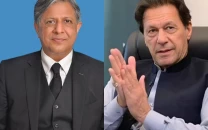Pakistani students see disinformation as threat to polls, democracy: study
81% of surveyed youth believes social media websites are most prone to spread of disinformation

A recent research study conducted by the Coalition Against Disinformation (CAD), an alliance comprising academia, digital media, and civil society organisations, sheds light on the perceptions and impact of disinformation among university students in Pakistan.
Titled "Perceptions and Impact of Disinformation on Pakistani Youth: How University Students Understand Disinformation," the study highlights the challenges faced by educated youth in countering the harmful effects of online misinformation.
The collaborative research involved the mass communication and media departments of 10 public sector and private universities, all voluntary founding members of CAD. The study, based on a national survey of 1,043 students, reveals that 63% of university students encounter some form of online disinformation at least daily.
Key findings from the study indicate that a significant majority (81%) of the surveyed youth believes that social media websites are most prone to the spread of disinformation, with approximately 70% identifying Facebook as the most vulnerable social network for false messages.
In terms of perceptions, the study reveals that most students think disinformation is intentionally spread to manipulate the public and could lead to the propagation of false beliefs. A notable 62% of the students believe online disinformation "poses a threat to democracy and elections."
Also read: Disinformation in AI era
The study also delves into the trust levels of students in online information sources. Approximately half of the respondents frequently trust information provided by traditional news organisations and government websites. Trust in information supplied by vloggers and celebrity influencers was mostly occasional. However, the study notes that around 60% of students are more likely to engage with content originating from sources they trust.
One concerning revelation is that less than four in every 10 students claimed to fact-check the information they receive online. A third of the students were not aware of fact-checking tools, and around 41% had never consulted professional fact-checking websites that debunk viral false claims.
Iqbal Khattak, Executive Director of Freedom Network, which manages the Coalition, expressed concern over the findings. He emphasised that although the youth are worried about false messages, their ability to protect against the harmful effects of online disinformation is limited.
Khattak underscored the importance of the study, stating that it provides valuable insights for key stakeholders such as the Election Commission of Pakistan, political parties, the state, and civil society to address challenges to trust in media, political communication, and upcoming national events, including elections scheduled in February.
As part of the study's recommendations, it suggests the introduction of media literacy programmes at universities and the integration of fact-checking modules into higher education curricula.
The study also proposes national media literacy campaigns to educate citizens of all ages about source verification and the critical use of online information. These measures aim to empower individuals, especially the youth, to navigate the digital landscape responsibly and counter the effects of disinformation.



















COMMENTS
Comments are moderated and generally will be posted if they are on-topic and not abusive.
For more information, please see our Comments FAQ